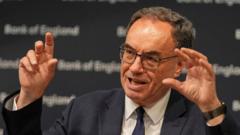Could the Bank of England Cut Rates If the Job Market Slows?

The Future of Interest Rates in the UK: Insights from the Bank of England's Governor
The discussion around interest rates has become increasingly relevant as economic conditions shift in the UK. With the job market showing signs of slowing, the Bank of England’s governor, Andrew Bailey, has indicated a willingness to consider larger interest rate cuts in response to changing economic indicators. This article will explore the implications of Bailey's statements, the current state of the UK economy, and how these factors could influence individuals and businesses alike.
Understanding Interest Rates and Their Impact
Interest rates are a critical component of the economy, influencing everything from mortgage rates to credit card charges and savings accounts. In the UK, the current interest rate stands at 4.25%. This rate is pivotal as it affects the cost of borrowing and the return on savings for millions of people across the nation. A change in interest rates can have a ripple effect on consumer spending, business investments, and overall economic growth.
The Role of the Bank of England
The Bank of England (BoE) is responsible for setting the base interest rate, which is reviewed regularly. The decisions made during these reviews are based on various economic indicators, including inflation, employment levels, and growth rates. As the UK navigates through economic challenges, the BoE's policies aim to stabilize the economy and encourage growth.
Current Economic Landscape
The UK economy has shown signs of strain recently. According to the Office for National Statistics, the economy contracted by 0.1% in May, following a similar decline in April. This decrease was largely attributed to a drop in manufacturing, compounded by weak retail sales. Such contractions can lead to decreased consumer confidence and lower spending, further exacerbating economic challenges.
Job Market Adjustments
In his interview, Andrew Bailey noted that businesses are beginning to adjust their employment strategies. This includes reducing hours and offering smaller pay rises. These adjustments are likely a direct response to the increased national insurance contributions imposed by Chancellor Rachel Reeves, which rose from 13.8% to 15% starting in April. This policy aims to generate approximately £25 billion annually for the government, but it has also placed additional financial pressure on employers.
Potential for Interest Rate Cuts
Bailey's assertion that "the path is downward" regarding interest rates is a significant signal for the market. He emphasized the importance of a "gradual and careful" approach to cutting rates, especially in light of persistent inflation that remains above the target levels set by the BoE.
Inflation and Economic Slack
One of the key factors influencing Bailey's perspective on interest rates is the concept of "economic slack." As the UK economy grows but remains below its potential, there is an opportunity to bring down inflation without triggering adverse effects on growth. Lower interest rates could stimulate borrowing and spending, potentially leading to a more robust economic recovery.
The Impact of Rate Changes on Households and Businesses
For households, changes in interest rates can have profound effects. A lower interest rate typically means lower mortgage payments, reduced credit card interest, and better savings rates. Here’s how these changes can directly impact different sectors:
- Mortgages: Homeowners with variable-rate mortgages could see immediate reductions in their monthly payments, relieving financial pressure.
- Credit Cards: Lower interest rates can reduce the cost of borrowing on credit cards, encouraging more consumer spending.
- Savings: While lower rates may diminish returns on savings accounts, they could also incentivize spending, which could help stimulate the economy.
Business Considerations
For businesses, especially small and medium enterprises (SMEs), the implications of interest rate changes are equally significant. A decline in interest rates can facilitate access to affordable financing, enabling businesses to invest in growth, hire additional staff, and expand operations. Conversely, if rates remain high, it may deter investment and slow growth, further straining the economy.
Looking Ahead: Future Meetings and Economic Indicators
The next review of interest rates by the Bank of England is scheduled for August 7. As economic conditions continue to evolve, stakeholders will be closely watching for any announcements regarding rate changes. Economic indicators such as employment figures, inflation rates, and manufacturing output will play a crucial role in shaping the BoE's decision-making process.
Government's Economic Strategy
The UK government has prioritized boosting economic growth, particularly in light of recent contractions. As Bailey indicated, the government’s policies, including adjustments to national insurance, are designed to generate revenue but may also have unintended consequences on employment and business growth.
Final Thoughts
The landscape of interest rates in the UK is poised for potential changes, driven by economic indicators and the job market's performance. As consumers and businesses prepare for the outcomes of the Bank of England's upcoming decisions, understanding the implications of these rates becomes essential for making informed financial choices.
With the economy’s performance under scrutiny, the conversation around interest rates will continue to be a focal point of discussion among economists, policymakers, and the public. The path forward is complex but crucial for the UK’s economic health.
FAQs
What is the current interest rate set by the Bank of England?
The current interest rate is set at 4.25% as of the latest review.
How do interest rate changes affect mortgages?
Changes in interest rates directly influence mortgage rates, impacting monthly payments for homeowners, especially those with variable-rate mortgages.
What factors does the Bank of England consider when setting interest rates?
The Bank of England considers various factors, including inflation rates, employment levels, economic growth, and external economic conditions when setting interest rates.
As we await the Bank of England's next moves, how do you believe interest rates will influence your financial decisions in the coming months? #InterestRates #BankofEngland #EconomicGrowth
Published: 2025-07-14 02:20:20 | Category: technology



